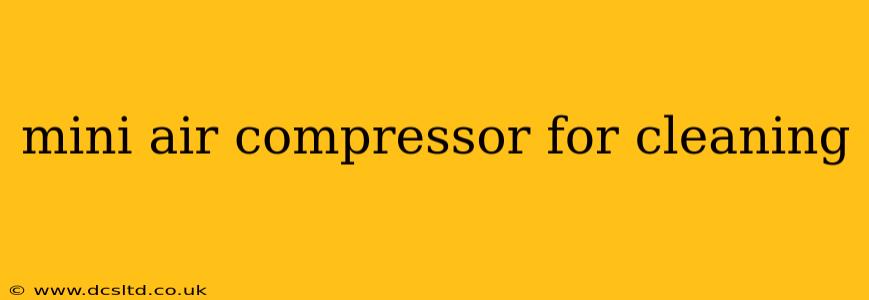Mini air compressors are invaluable tools for a variety of cleaning tasks, offering a powerful and convenient way to remove dust, debris, and dirt from hard-to-reach areas. Whether you're detailing your car, cleaning your computer keyboard, or tackling a delicate craft project, choosing the right mini air compressor can significantly improve efficiency and results. This guide will help you navigate the world of mini air compressors for cleaning, addressing common questions and highlighting key features to consider.
What are the Best Mini Air Compressors for Cleaning?
Selecting the "best" mini air compressor depends heavily on your specific needs. Factors like tank size, CFM (Cubic Feet per Minute) output, and PSI (Pounds per Square Inch) pressure all play a crucial role. Generally, for cleaning applications, you'll want a compressor with sufficient CFM for consistent airflow and enough PSI to provide adequate cleaning power without damaging delicate surfaces. Look for models with adjustable pressure regulators for greater control. Many reputable brands offer excellent mini air compressors designed for cleaning; researching reviews from other users is always advisable.
What PSI is Needed for Cleaning?
The ideal PSI for cleaning varies significantly depending on the task. Low PSI (around 20-40 PSI) is suitable for delicate cleaning jobs like removing dust from electronics or blowing off loose debris from delicate surfaces. Higher PSI (up to 90 PSI or more) might be necessary for more demanding cleaning tasks, such as removing stubborn dirt from crevices or powering specialized cleaning attachments. Always start with a lower PSI and gradually increase it as needed, being mindful of the material you are cleaning.
How Much CFM Do I Need for Cleaning?
CFM (Cubic Feet per Minute) refers to the volume of air the compressor can deliver. Higher CFM values generally translate to a more consistent and powerful airflow, which is essential for efficient cleaning. For most cleaning tasks involving mini air compressors, a CFM rating between 0.5 and 2.0 CFM should be sufficient. However, if you anticipate using air tools or performing more intensive cleaning operations, you might need a higher CFM rating.
What is the Difference Between an Oil-Lubricated and Oil-Free Mini Air Compressor?
Oil-lubricated compressors typically offer longer lifespans and quieter operation, but require regular oil changes and maintenance. Oil-free compressors are easier to maintain, as they don't require oil changes, but they may have a shorter lifespan and generate more noise. For occasional cleaning tasks, an oil-free mini air compressor is often a convenient and practical choice. However, for frequent or heavy-duty use, an oil-lubricated model might be a more durable investment.
Are Mini Air Compressors Good for Cleaning Cars?
Yes, mini air compressors are excellent for cleaning cars, particularly for detailing tasks. They can effectively remove dust, dirt, and debris from various areas, including crevices, vents, and upholstery. Combined with appropriate cleaning attachments, like detailing brushes or air blow guns, they can achieve professional-looking results. However, remember to use appropriate PSI to avoid damaging delicate car parts.
What Attachments Do I Need for Cleaning with a Mini Air Compressor?
The types of attachments you'll need depend on your specific cleaning tasks. Common attachments include:
- Air blow guns: For general cleaning and removing loose debris.
- Detailing brushes: For cleaning intricate areas and hard-to-reach spots.
- Inflatable cleaning nozzles: For directing airflow more precisely.
- Vacuum attachments: For simultaneously cleaning and removing debris.
Choosing the right attachments can significantly enhance the efficiency and effectiveness of your cleaning.
Conclusion
Mini air compressors are versatile and powerful tools ideal for a wide range of cleaning applications. By carefully considering factors like PSI, CFM, lubrication type, and necessary attachments, you can select the perfect mini air compressor to meet your specific cleaning needs and achieve professional-quality results efficiently. Remember to always prioritize safety and follow manufacturer instructions when operating your air compressor.
